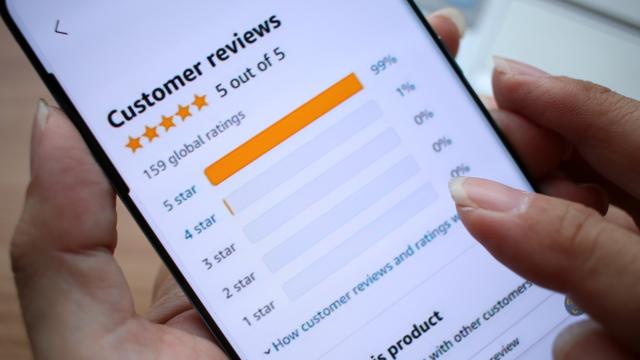The marketplace of the internet has turned into a game of Russian roulette as platforms providing everything from household goods to airline tickets are becoming less trustworthy with the rise of fake reviews. Now, the heavy hitters of online commerce are joining forces to put an end to fake reviews.
Sites including Amazon, Booking.com, Glassdoor, Expedia, TripAdvisor, and Trustpilot collectively announced the Coalition for Trusted Reviews in a bid to define best practices for thwarting fake reviews. The coalition was born in October 2022 at the inaugural Fake Reviews Conference, organized by TripAdvisor, which included guests from government, academia, and industry to address challenges surrounding spotting fake reviews. The companies will meet once again at the second Fake Reviews Conference in Brussels this December.
“The trust that consumers and partners have in our platforms and businesses is a top priority for the members of this coalition, all of whom agreed to join together to fight fake review content on the Internet,” said Becky Foley, vice president of trust and safety at TripAdvisor. “To further maintain the credibility and authenticity of reviews on our platforms, we aim to make it increasingly difficult for fraudulent actors who try to deceive our customers to operate online.”
Everyone from job seekers on Glassdoor, shoppers on Amazon, and wanderlust travelers on Expedia rely on those platforms’ reviews to gauge how legitimate, positive, or reliable an experience of a product will be. The group hasn’t specified what technology or methods they will specifically use to spot or remove fake reviews but has identified four key areas worth pursuing. Those areas are alignment across the online commerce industry, sharing best practices on content moderation, sharing information on how fake reviewers operate, and working with academics and government officials.
Fake reviews have been in the crosshairs of platforms like Amazon for quite some time. Last summer, the online marketplace announced it filed a lawsuit against the administrators of over 10,000 Facebook groups. The company alleged those administrators were part of a coordinated effort to recruit individuals to leave fake reviews for different products on Amazon stores in the United States, United Kingdom, Germany, France, Italy, Spain, and Japan. Amazon said that one group in particular had 43,000 members until it was taken down by Meta in early 2022. Administrators of these groups were able to obfuscate their activity from Facebook’s content filters by omitting certain letters from problematic words.
With the meteoric rise of artificial intelligence, however, fake reviewers now have another tool in their arsenal to further their cause. Items across Amazon’s store had reviews written by a large language model like ChatGPT. Even more jarring is that these reviews make no effort to hide the fact that they were generated with AI, as most reviews begin with the phrase “As an AI language model” before devolving into the fact that a computer has no experience with the product. Whether generated by a human or machine, fake reviews not only annoy Amazon they also rip off consumers. A paper presented in July 2022 at the National Bureau of Economic Research Summer Institute found that not only do fake reviews get users to buy lower-quality products, but they also get users to spend upwards of 12 extra cents per dollar.
